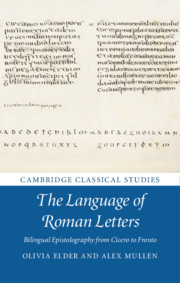Book contents
- The Language of Roman Letters
- Cambridge Classical Studies
- The Language of Roman Letters
- Copyright page
- Dedication
- Contents
- Tables
- Acknowledgements
- Abbreviations
- Chapter 1 Language and Life in Letters
- Chapter 2 A Roman Conversation? Code-Switching in Diachronic Context
- Chapter 3 Republic of Letters: The Politics of Cicero’s Epistolary Code-Switching
- Chapter 4 Imperial Relations: Greek and the lingua Romana of Fronto and Friends
- Chapter 5 The Language of Letters and Beyond: Greek in Suetonius’ Biographies
- Chapter 6 Weaving together the Threads: Epistolary Connections
- Appendix: Functions of the Code-Switches
- Bibliography
- Index
Chapter 1 - Language and Life in Letters
Published online by Cambridge University Press: 26 September 2019
- The Language of Roman Letters
- Cambridge Classical Studies
- The Language of Roman Letters
- Copyright page
- Dedication
- Contents
- Tables
- Acknowledgements
- Abbreviations
- Chapter 1 Language and Life in Letters
- Chapter 2 A Roman Conversation? Code-Switching in Diachronic Context
- Chapter 3 Republic of Letters: The Politics of Cicero’s Epistolary Code-Switching
- Chapter 4 Imperial Relations: Greek and the lingua Romana of Fronto and Friends
- Chapter 5 The Language of Letters and Beyond: Greek in Suetonius’ Biographies
- Chapter 6 Weaving together the Threads: Epistolary Connections
- Appendix: Functions of the Code-Switches
- Bibliography
- Index
Summary
In an awkward letter to Atticus (Att. I.1), Cicero has to defend his decision not to speak against one of his own clients, Caninius Satyrus, who has allegedly defrauded Atticus’ uncle, Caecilius.
- Type
- Chapter
- Information
- The Language of Roman LettersBilingual Epistolography from Cicero to Fronto, pp. 1 - 39Publisher: Cambridge University PressPrint publication year: 2019

